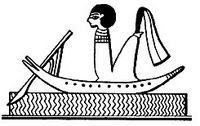Moore: Looking for Jesus in the 21st Century
Thomas Moore writes the following for Hay House's email newsletter, under the Barque headline above:
"The good news is that we are creating a new world order in which the first task is to heal each other.The Hay House newsletter continues, "'Thomas Moore's groundbreaking reinterpretation of the Gospels shines a new light on the profound teachings of Jesus, offers readers a long-awaited, modern, practical application of the scripture, and illustrates the 21st-century relevance of Jesus' visionary philosophy,' says Deepak Chopra. Delve deeper into Thomas Moore's Writing in the Sand: Jesus & the Soul of the Gospels , available now at HayHouse.com. Thomas Moore is perhaps best known as the author of the New York Times bestseller Care of the Soul. His other works include Soul Mates and Life at Work. You can meet Thomas Moore this Fall when he makes a rare appearance to talk about the Gospels and healing at Hay House's I Can Do It! Conference in Tampa."
The Buddha begins his teaching with the simple observation that there is suffering in the world. Jesus similarly focuses on the sickness of the soul that affects people individually and socially, physically and spiritually. This perception of sickness is central, and healing is his signature activity. Jesus does not teach how to be virtuous, how to be saved, or how to be a good church member. He says nothing about memorizing dogma or following a strict set of moral rules. Instead, he continually demonstrates how to be in this world as a healer.
I know a Christian minister who is an instinctive healer. Everywhere he goes, he sees need when it is present. Where others overlook a person in distress, he stops to find out what is wrong. He has a Gospel instinct and knows intuitively that the role of minister is to heal.
I know several ministers who don't have this gift. It doesn't come with ordination. I do have a Buddhist friend who responds similarly, and, to my mind, his healing reactions place him in the kingdom Jesus envisioned. He is a Buddhist by affiliation, but his way of life is precisely in tune with the way Jesus taught. He found his way into the kingdom through Buddha.
The Gospels use several words for healing, but the main one is therapeia, "therapy." Plato used this very word in the dialogue Euthyphro, where Socrates defines it as "service of the gods." When you heal, you are doing sacred work. The Gospels appeared 400 years after Plato, and yet they, too, emphasize the word therapeia, a word so important that it could identify the Gospel spirit wherever it appears. If you want to live the Gospel philosophy, you have to know what it takes to be a healer.
I understand that this word healer sometimes seems romantic, but in fact it represents a cold, clear, harsh reality. People suffer — emotionally, physically, spiritually, and relationally. They need help. From time to time we are all in need of healing, and we are all called to be healers.
There was a time in my life when I needed healing. I had just gone through a divorce. I was fired from my job as a college professor — the only career I wanted at the time and one in which I had invested years of study. I was so upset that I felt sick and sores appeared in my throat and mouth. In reaction, I became too dependent on a few close friends, and many people around me pitied me and told me, essentially, to grow up. But another friend, James Hillman, a Jewish man who had written many things critical of Christianity, visited me and gave me some food, a glass of wine, and some thoughtful, friendly counsel. I have never forgotten his generous response. From my point of view, he was a healer in the spirit of the Gospel.
Healing is an altruistic action, in the root sense of the word — other . You think about the other person's welfare. You are profoundly convivial, meaning that you "live with" others, not just for yourself. You heal because of your empathy for the suffering of the other.
In the Gospels, Jesus never frets about himself. He is always in response mode, noticing suffering of all kinds and responding to it with a healing word or touch."
This description outlines Moore's presentation in Tampa on Sunday 22 November 2009, 11:00 a.m. - 12:30 p.m.:
The Soul of MedicineCheck out a recent a Barque: Thomas Moore Work post for an interview with Thomas Moore on Hay House Radio.
Through stories from Thomas Moore’s patients, doctors, nurses, and other healthcare workers, Thomas speaks to the importance of healing a whole person—body, soul, and spirit, a person with emotions, history, family, and work rather than simply treating a body. He gives advice to both healthcare providers and patients for maintaining dignity and humanity during illness and treatment. Providing spiritual guidance for dealing with feelings of mortality and depression, Thomas encourages patients to not only take an active part in the healing process, but also to view illness as a positive passage to new awareness and possibilities for life.
While we don’t fully understand the extent to which healing depends on attitude; a sense of meaning; a healing atmosphere; spirituality; and the support of family, friends, and community, it has been shown time after time that healing needs to focus on more than the body. The future of medicine is more than new technical developments and research discoveries; it lies also in appreciating the state of soul and spirit in illness!
Labels: Event, Jesus, Medicine, The Soul of Medicine, Thomas Moore, Writing in the Sand












